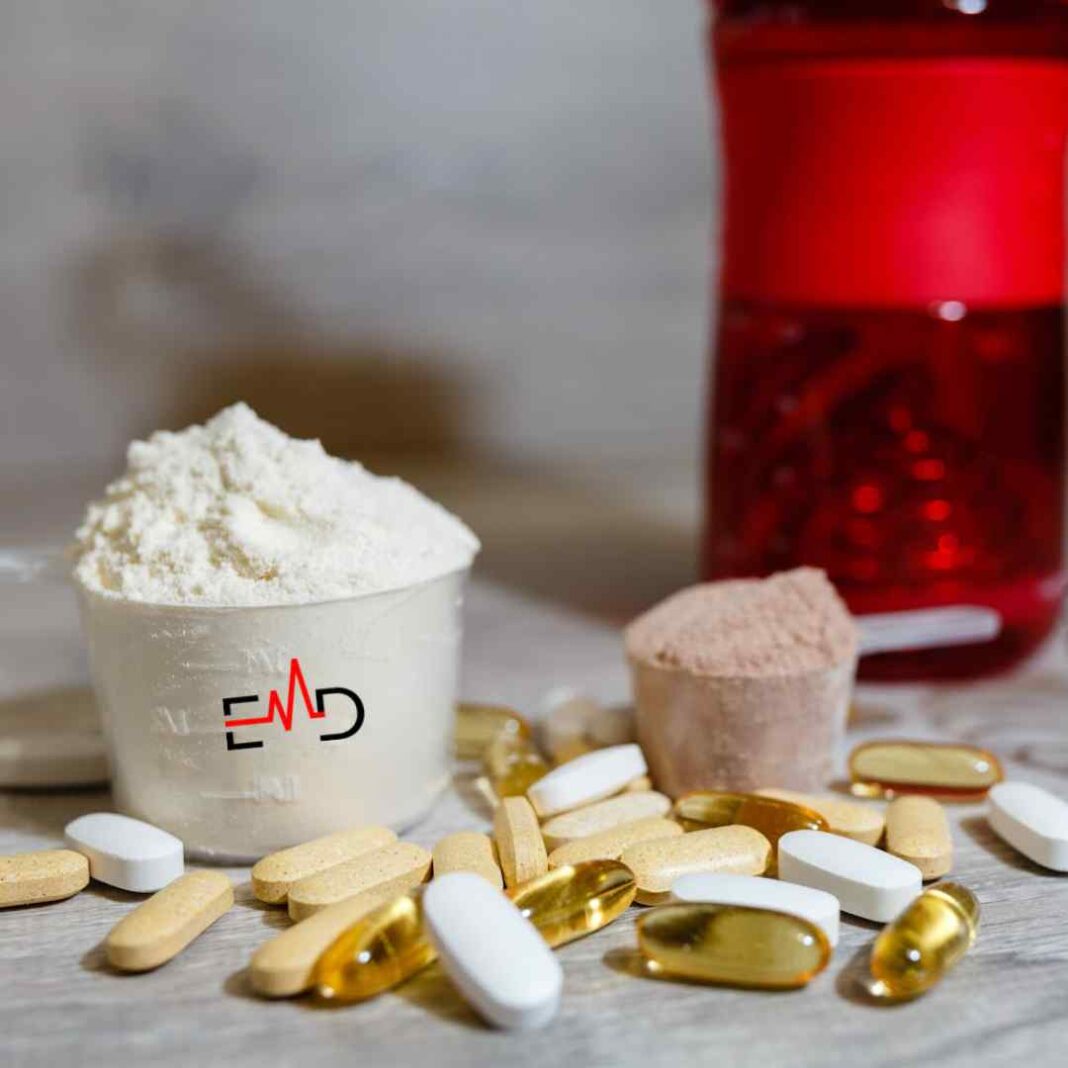Exercise Daily – Sports supplements, also referred to as dietary supplements, are specifically formulated products intended to optimize sports performance and cater to the nutritional requirements of athletes. Available in diverse forms such as powders, pills, capsules, and liquids, these supplements contain targeted nutrients or compounds crucial for enhancing athletic abilities, which may not be sufficiently obtained from regular dietary sources alone.
Supplements are worth considering for individuals seeking to improve their sports performance, increase muscle mass, and boost endurance performance. Several reputable organizations, such as the International Society of Sports Nutrition, the American College of Sports Medicine, and the Academy of Nutrition and Dietetics, support the efficacy and safety of certain supplements for enhancing exercise performance and supporting muscle mass and strength.
Key ingredients commonly found in sports supplements include beta-alanine, branched-chain amino acids, soy protein, and plant-based protein. These supplements may also include energy drinks or pre-workout formulations to provide energy and enhance exercise performance.

Importance of sports nutrition
Sports nutrition plays a vital role in optimizing athletic performance. Proper nutrition provides the necessary fuel for energy, supports muscle growth and recovery, and helps athletes achieve their goals. While a well-balanced diet is essential, sports supplements can complement and support an athlete’s nutritional needs, especially during intense training and competition.
Types of Sports Supplements
It’s essential to use supplements responsibly and as directed by a healthcare provider, particularly for trained athletes or those in intense athletic activity. Before incorporating any supplements into your regimen, it’s advisable to consult with a qualified health professional, such as a physician or a sports nutrition specialist, to ensure safety and effectiveness. Additionally, it’s crucial to adhere to recommended usage guidelines and prioritize the safety of supplements, including creatine and caffeine, when used in appropriate doses.
1. Protein supplements
This Protein is a fundamental nutrient for athletes, promoting muscle repair and growth. Protein supplements, such as whey protein powder, are widely popular among athletes. They provide a convenient and concentrated source of high-quality protein that can be easily consumed before or after workouts to optimize muscle recovery.
2. Creatine supplements
Creatine is a naturally occurring compound in the body that plays a crucial role in energy production during short, intense bursts of exercise. The Creatine supplements, typically creatine monohydrate, have been extensively studied and proven to enhance athletic performance, particularly in activities that require explosive power, like weightlifting and sprinting.
3. Endurance supplements
These Endurance sports, such as long-distance running or cycling, demand sustained energy production and enhanced stamina. Endurance supplements, including sports drinks and gels, provide carbohydrates, electrolytes, and other nutrients to support prolonged physical activity and help delay fatigue.
4. Vitamins and minerals
Vitamins and minerals are essential for overall health and well-being. Athletes may have increased nutrient requirements due to their intense training regimens. Sports nutrition supplements often include vitamins and minerals to ensure athletes meet their daily needs and support optimal performance.

Benefits of Sports Supplements
Enhancing athletic performance
Sports supplements can positively impact athletic performance. Certain supplements, such as creatine and caffeine, have been extensively researched and shown to enhance strength, power, and overall exercise performance. However, it’s important to note that individual responses may vary, and not all supplements work the same for everyone.
Muscle growth and recovery
One of the primary goals for many athletes is to build and maintain lean muscle mass. Protein supplements, particularly those containing essential amino acids, can support muscle protein synthesis, aiding muscle growth and recovery after intense workouts.
Improved endurance
Endurance athletes rely on their ability to sustain prolonged physical activity. Endurance supplements, such as carbohydrate-rich sports drinks and gels, can provide a readily available energy source to fuel long-distance races or intense training sessions, helping athletes maintain performance and delay fatigue.
Choosing the Right Sports Supplements
Considerations for athletes
When selecting sports supplements, it’s important to consider individual needs, training goals, and specific dietary requirements. Different sports and activities may benefit from specific supplements. Consulting with a qualified sports dietitian or healthcare professional can help determine the most suitable supplements for your athletic endeavours.
Consulting with a dietitian
A sports dietitian is a valuable resource for athletes seeking guidance on sports nutrition and supplement choices. They can assess your needs, provide personalized recommendations, and ensure you optimize your supplement regimen while maintaining a well-balanced diet.

Safety and Efficacy of Sports Supplements
Regulation and quality control
The safety and efficacy of sports supplements are crucial considerations for athletes. While dietary supplements are regulated by the Food and Drug Administration (FDA) in the United States, the regulations are not as stringent as those for pharmaceutical drugs. This means that manufacturers are responsible for ensuring the safety and quality of their products. However, some supplements may still contain undisclosed ingredients or contaminants, making choosing reputable brands and products essential.
Potential risks and side effects
Although many sports supplements are generally safe when used as directed, there can be potential risks and side effects. For example, some supplements may interact with medications or adversely affect certain individuals. It’s important to know the potential risks associated with specific supplements and consult a healthcare professional before starting any new supplement regimen.
Sports Supplements: Worth It or Not?
Evidence-based effectiveness
When considering sports supplements, evaluating the evidence behind their effectiveness is crucial. While some supplements have a solid scientific foundation supporting their benefits, others may lack sufficient research. Look for supplements that have been extensively studied and proven to work for their intended purposes.
Individual variability
It’s important to recognize that individual responses to sports supplements can vary. Genetics, training status, diet, and overall health can influence how supplements affect an individual. What works for one athlete may not work the same for another. Experimentation and personalization are key when incorporating supplements into your routine.
Incorporating Sports Supplements into Your Routine
Proper usage and timing
It’s important to follow proper usage guidelines and consider timing to maximise the benefits of sports supplements. For example, protein supplements are often consumed before or after workouts to support muscle recovery. Supplements, on the other hand, are typically used during prolonged physical activity to maintain energy levels. Understanding the recommended usage and timing can help optimize the effects of supplements.
Combination with whole foods
While sports supplements can provide convenience and targeted nutrition, they should not replace whole foods in a well-balanced diet. Whole foods offer a wide range of nutrients, fibre, and phytochemicals that benefit overall health. Sports supplements should complement a nutritious diet rather than serve as a substitute.

Conclusion
Sports supplements can be valuable tools for athletes looking to optimize their performance and meet their nutritional needs. However, it’s essential to approach supplement use cautiously and make informed decisions. Consider your goals, consult healthcare professionals, and evaluate the evidence behind specific supplements. Combining personalized supplement choices with a balanced diet and appropriate training can enhance your athletic performance and reach your full potential.
While sports supplements can offer potential performance benefits, individuals interested in using them should approach them cautiously, seek guidance from healthcare professionals, and prioritize their health and nutrition goals.
FAQs – Sports Supplements: What do you actually need?
Q: Are sports supplements only for professional athletes?
A: Sports supplements can benefit athletes at various levels, from recreational to professional. Incorporating supplements into your routine depends on your specific needs, goals, and consultation with healthcare professionals.
Q: Can sports supplements replace a healthy diet?
A: Sports supplements should not replace a well-balanced diet. While they can provide targeted nutrients, whole foods offer many benefits that supplements alone cannot replicate.
Q: Are sports supplements safe to use?
A: Many sports supplements are generally safe when used as directed. However, it is important to be aware of potential risks, medication interactions, and individual sensitivities. Consultation with a healthcare professional is recommended.
Q: How long does it take to see results from sports supplements?
A: The timeframe for seeing results from sports supplements can vary depending on the supplement and individual factors. Some supplements may show immediate effects, while others may require consistent use over a longer period. Patience and adherence to proper usage guidelines are key.
Q: Can I stack multiple sports supplements together?
A: Stacking multiple sports supplements can be done, but it’s crucial to do so with caution and under the guidance of a qualified professional. Some supplements may interact with each other or have cumulative effects that require careful monitoring.




